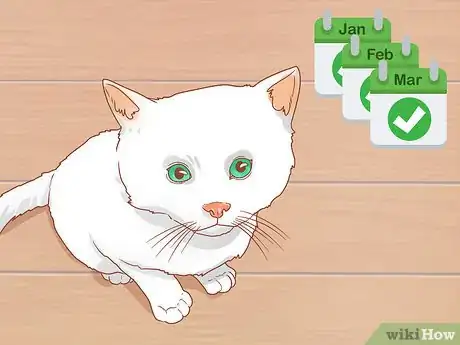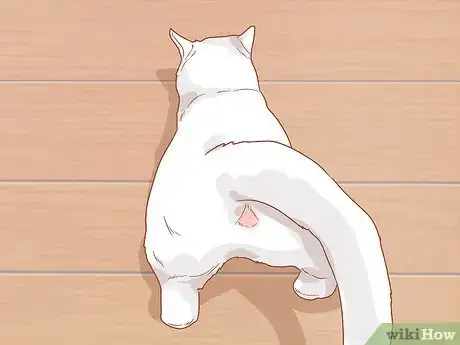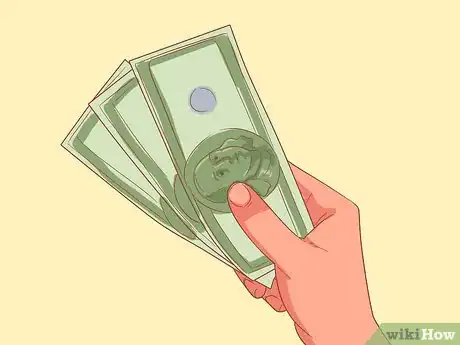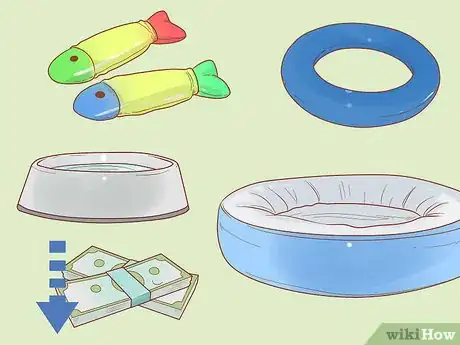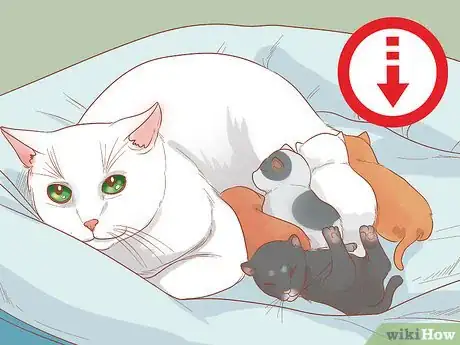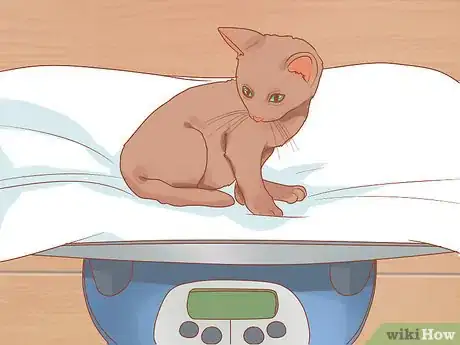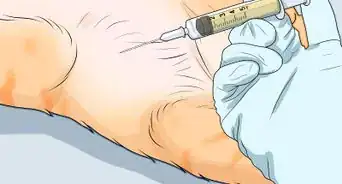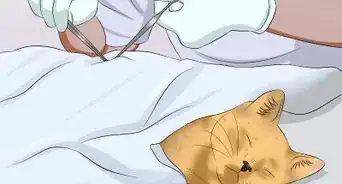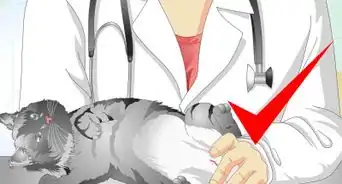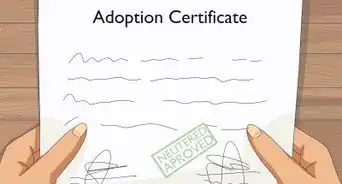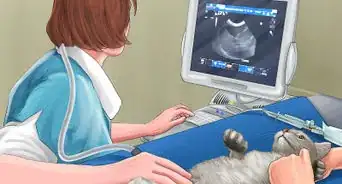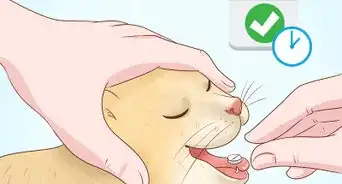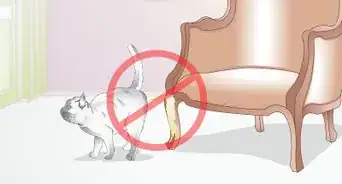This article was co-authored by Pippa Elliott, MRCVS. Dr. Elliott, BVMS, MRCVS is a veterinarian with over 30 years of experience in veterinary surgery and companion animal practice. She graduated from the University of Glasgow in 1987 with a degree in veterinary medicine and surgery. She has worked at the same animal clinic in her hometown for over 20 years.
wikiHow marks an article as reader-approved once it receives enough positive feedback. In this case, 96% of readers who voted found the article helpful, earning it our reader-approved status.
This article has been viewed 94,612 times.
If you decide to adopt a kitten, you will need to decide when to spay or neuter it. If you get your kitten spayed or neutered when it is too young, it can negatively affect the cat. However, if you spay or neuter your kitten too late, you can miss out on some of the benefits that spaying and neutering can provide. In order to figure out if your kitten is old enough to get spayed or neutered, you will need to know your kitten's age, when the suggested age of spaying and neutering is, and when your veterinarian suggests completing the surgery. With this information, you can get your kitten spayed or neutered at the perfect time.
Steps
Deciding When to Spay or Neuter Your Kitten
-
1Wait until your kitten is several months old. There is some debate about when cats should be fixed. Some experts suggest getting a kitten spayed or neutered when the cat is as young as two months old. Others, arguing that cats need more time to develop before removing their sex organs, say that spaying and neutering should occur closer to when the cat is four months old.[1]
- In general, in an effort to limit pet populations, early spaying and neutering is encouraged. Many veterinarians agree that it is better to spay or neuter your kitten a bit early rather than risking it starting its reproductive cycle and getting impregnated accidentally.
-
2Have a female kitten spayed before its first estrus. It is a myth that you should wait until a cat has its first estrus before getting it spayed. Instead, doing it before her first cycle can actually help her health in the future.
- Having your kitten fixed before her first estrus minimizes the risk of some health conditions that could pop up in the future, for instance mammary tumors.
Advertisement -
3Consult with your veterinarian. Your veterinarian will have the best idea about when your kitten is ready to be spayed or neutered. Have a discussion with the vet about when the surgery should occur and why the vet believes your kitten is ready.[2]
- Feel free to ask the veterinarian any questions that you have about the surgery. You should get enough information so that you are secure in your decision to get your cat spayed or neutered.
Choosing to Spay or Neuter Your Kitten
-
1Consider the benefits to your kitten. There are a variety of health benefits to your kitten if you get it spayed or neutered. These benefits, in spite of the difficulty of surgery, make getting your kitten fixed worth the discomfort it may experience.[3]
- For example, spayed cats will not suffer from ovarian or uterine cancer, or uterine infections, later in life.
-
2Consider the benefits to your household. Getting a kitten spayed or neutered doesn't just affect the cat. It also can have a positive impact on you and your family. For example, spaying and neutering your kitten will eliminate the chances of an accidental pregnancy, which in turn will eliminate the chances of you having to deal with a litter of additional kittens.
- Spayed and neutered cats are also less likely to fight. This means that in a multi-cat household, female cats that are spayed are more likely to get along and male cats are likely to be less aggressive and less territorial. For male cats, this means they are less likely to spray in your home to mark their territory.
-
3Consider the benefits to society. Stopping your kitten from reproducing in the future helps to limit the pet population overall. Fewer cats that are capable of reproduction means that fewer cats can be produced overall.[4]
- Also, if you are debating whether or not to have your kitten fixed, just remember that any kittens your kitten has in the future will take homes away from cats that live in shelters and that don't have families. In many cases, these cats are even put down due to a lack of space and resources.
Determining Your Kitten's Age
-
1Weigh your kitten. If you want to get your kitten spayed or neutered when it is two months old, then look for signs that it is that age. In general, a kitten that is two months old should weigh approximately two pounds, as long as it has had proper nutrition and care.[5]
- Two pounds is the weight that is required for your kitten to get desexing surgery. Any lighter than that and the veterinarian performing the surgery may be worried about the kitten's ability to survive the surgery.
-
2Look for physical clues about age. If you are not sure how old your kitten is, you can estimate its age by assessing its physical characteristics. Newborn kittens have closed eyes and ears that are tucked against their heads. These clues signal that you have a kitten that it only a few weeks old.[6]
- However, if your kitten has open eyes and popped up ears but tiny baby teeth, then it is between one and three months old.
- A cat that it getting, or already has, its adult teeth is at least four months old.
-
3Assess your kitten's development. A two month old kitten should be fully weaned from its mother. If your kitten is still nursing, then it is probably not yet two months old. If you notice the kitten's mother trying to wean the kitten, for example not letting it nurse, then the kitten is probably between one and one and a half months old.[7]
- Kittens that are two months old are also working on their paw and eye coordination. If a kitten is playing a lot with toys and getting more daring, then it is probably at least two months old.
References
- ↑ http://source.colostate.edu/pet-health-timing-spay-neuter-depends-individual-pet-owner/
- ↑ https://www.mspca.org/pet_resources/ask-a-vet-all-you-need-to-know-about-spayneuter-surgery/
- ↑ http://source.colostate.edu/pet-health-timing-spay-neuter-depends-individual-pet-owner/
- ↑ http://www.aspca.org/pet-care/general-pet-care/spayneuter-your-pet
- ↑ http://www.alleycat.org/resources/kitten-progression/
- ↑ http://www.vcahospitals.com/main/pet-health-information/article/animal-health/retained-deciduous-teeth-baby-teeth-in-cats/2247
- ↑ http://www.aspca.org/pet-care/cat-care/cat-nutrition-tips
About This Article
To know if a kitten is old enough to neuter or spay, wait until it’s at least 3 months old so it’s developed enough. If you’re not sure how old the kitten is, wait until it weighs at least 2 pounds. Additionally, look for other signs that the kitten is old enough to be neutered or spayed, like playing a lot with toys or getting more daring about exploring its environment. Once you spot these signs, make an appointment with your veterinarian, who will examine your kitten and confirm whether it’s ready for neutering or spaying. For more advice from out Veterinary co-author, like how to tell if a kitten is old enough to spay or neuter based on its teeth, keep reading.
